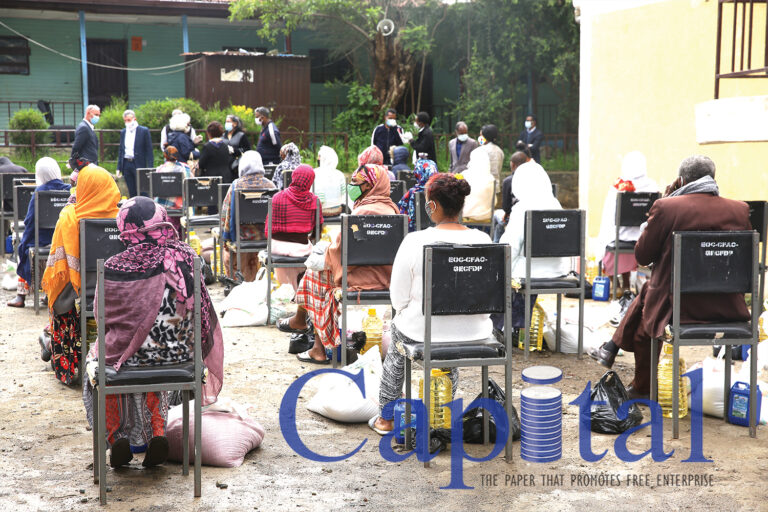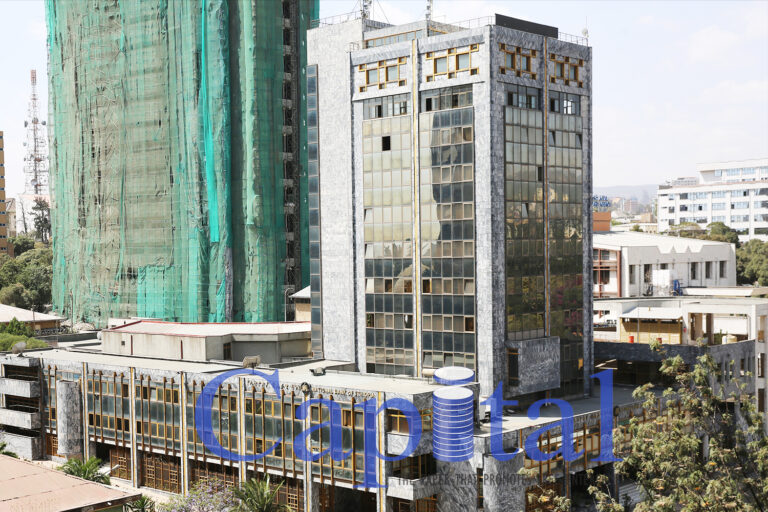In his appearance at the parliament on the extraordinary meeting PM Abiy Ahmed, disclosed that the country’s external debt has contracted to about 26 percent of the GDP from the previous 31 percent.
He said that at the current status the country’s external debt has returned to moderate level.
About four years ago the country’s foreign debt level become a high risk. “As a strong government we have improved this situation to a moderate level that is a big achievement,” Abiy said.
Ethiopian debt state drops to moderate level
SMLH in solidarity with Hizbawi Serawit School
Société des Membres de la Légion d’Honneur and National Order of Merit (SMLH-ONM),

formed to strengthen cooperation and friendship between French and Ethiopian communities, launched a three-month food support project for disadvantaged students of Hizbawi Serawit School and their families.
The project that runs for three consecutive months will benefit 100 children in need of support at the school with their families. To realize this project members of SMLH, BGI Ethiopia, Capital Newspaper, Syscom Plc and other companies and individuals came together to contribute their part as their corporate social responsibilities.
For SMLH providing support for Hizbawi Serawit School is not the first time; few months ago the association has also inaugurated a tap water and hygiene facilities for the students.
At the current stage SMLH has provided a basic need support for 100 students and their families aiming to alleviate the challenges that they face in relation to the COVID 19 pandemic. Previously these students were included in the City Government of Addis Ababa school feeding initiative. The initiative provides breakfast and lunch to children who go to school.
Teguest Yilma, President of SMLH-ONM Ethiopia, during the project launch said that over 500 family members will be beneficiary of this initiative. She said that the support will continue for the next three months. “On the basis that each student will have more or less five family members, the support we organized today will feed a family for one month,” she said.
She further noted that this initiative follows the call by PM Abiy Ahmed to help those in need in these difficult times. “We come forward to help these students and their families for food supplies for three months, this one is the first of the three rounds of help that we are committed to deliver,” said Teguest.
Students and their families will get basic food items like edible oil, rice, teff, flour and sanitary products for three months until the end of the rainy season.
During the launching ceremony which was held at the school’s premises on Saturday June 6, Dagnew Gebru deputy head of Addis Ababa Education Bureau said that these kinds of support will help the students and their families to pass these difficult times. “We are very grateful for the support SMLH provided today. This will also inspire others to do their part to help our students,” Dagnew said. 
Several actions have been carried out by the members of the SMLH for the benefit of this establishment, in particular through educational projects.
Colonel Stephane Richou, devoted advocate of SMLH-ONM Ethiopia, addressing the gathering said “this corona virus pandemic, instead of dividing and scaring us, has rather brought us together, strengthening our solidarity between two old friends, France and Ethiopia, but also the world over.”
“The military mission of the French embassy is much attached to this school, because there are in this school several children of veterans of the Korea and Congo wars. Our parents and grandparents have fought together.”
“Today’s gesture where a lot of generosity was expressed is small compared to the formidable gesture that your parents and grandparents contributed for the fight for freedom,” he thanked the parents.
The Ethiopian section of the SMLH has supported the school in Addis Ababa which is located in a popular and historic sector north of the capital. Close to the French Embassy, this district, called “Farensaï”, was reserved in the 1960s by emperor Haile Selassié for the settlement of the families of the combatants who participated in the first peacekeeping operations in Korea and Congo. 
The association of SMLH – Ethiopia was formed in 2013 by the recipients of the French government’s award of the Legion of Honor in recognition of eminent services rendered to their country and the strengthening of franco-ethiopian bilateral relations.
This Section of the SMLH-ONM Ethiopia traditionally brings together the decorated of these two French National Orders living in Ethiopia, both French and Ethiopian nationals.
Since 2017 the section was joined as ‘Friends’ by those honored with French ministerial awards, mainly academic awards in arts and literatures as well as agricultural merit, maritime merit among others.
Security service providers for an association
Security service providers formed a new association named Abay by 21 member companies.
According to Abel Worku Managing Director of Lion Security Service PLC which has more than 5,000 employees over the country and founder of the union, “the union gives us strength to stand for ourselves, it helps us to respond the grievance raised on the service providers.”
These companies are known by providing security personnel to international organizations, non-governmental organizations, governmental organizations, private companies, hotels and private residential quarters.
Mostly these service providers are said to be taking advantage of their employees as most of the employees saying that the percentage share the companies took compared to what they pay their employees is not fair. The employees say that the agencies share up to half percentage of their salary.
“The first thing which need to be understood is that we are not an agency, we are employer companies, we get the license from Ministry of Trade and Industry not from the Ministry of Labor and Social Affairs,” says Abel.
The Ministry of Labor and Social Affairs recently developed a protocol which set 20 percent share to be taken by the agencies and the rest 80 percent to the employees.
Even if the protocol is adopted by the Ministry, Abel said that the service provider companies did not agree on the issue. “The protocol is currently suspended by court after the agencies took the case to court,” Abel said.
The Ministry is planning to enact the protocol starting from June 30, 2020.
“We have to pay tax, pension, uniforms, and such other things for the employees and this is why we understood the need of establishing a union, to strength our stand,” said Abel adding that the service is serious with huge responsibility.
There are 287 security service providers in the country. According to Abel, membership of this union is based on their performance, legal documents and should be taxpayers.
Import value drops
The recent released quarterly bulletin report of National Bank of Ethiopia (NBE) second quarter report for the 2019/20 fiscal year indicates that the total merchandise import stood at USD 3.8 billion during the second quarter of 2019/20.
The report stated that the import value shows a 13.9 percent decrease over the last year same quarter due to lower import values of fuel, capital goods, consumer goods and miscellaneous goods.
The report further stated that import bill of capital goods fell by 28.2 percent and 88.4 percent decline in payments for transport capital goods despite 33 percent increase for industrial capital goods and 123.3 percent surge for agricultural capital goods. Hence, the share of capital goods in total goods import bill stood at 34.3 percent compared with 41.1 percent a year earlier.
Meanwhile the value of oil import dropped in the quarter, which is from October to December 2019, the volume has continued in its growth as in the past.
“Likewise, fuel import value decreased by 5.1 percent while its share in total import payments rose 16.7 percent from 15.2 percent last year same period,” the report states.
According to the NBE quarter report, besides fuel payments, consumer goods went down by 11.6 percent over the last year same quarter due to lower import payments for durable and non-durable goods.
“Nevertheless, the share of consumer goods in total imports slightly increased to 27.5 percent from 26.8 percent a year ago,” it added.
The total import value in the same period of last year was over USD 4.4 billion. “In juxtaposition, total merchandise import bill at USD 3.8 billion depicted a 13.9 percent annual decline due to lower import values of fuel (5.1 percent), capital goods (28.2 percent), consumer goods (11.6 percent) and miscellaneous goods (4.5 percent),” the quarterly report of NBE shows the sectors whose values are reduced for the period in the current fiscal year.
Such kind of report is rare. Even the quarterly report in the past shows slight value increment and expansion of trade balance gap. While the latest report of value reduction on import has also narrowed the trade balance.
According to the quarterly review the average price of Brent crude oil, which is used as a benchmark for international oil price, exhibited a 6.3 percent slowdown from USD 67.7 per barrel to USD 63.4 per barrel. The reduction of oil price has contributed for value reduction on import.
According to the report, the total current account payments also decreased by 13.6 percent and reached USD 5.2 billion due to a 13.9 percent decline in merchandise import payments and 13.7 percent in service payments.
The current payment on the same period in last year was almost USD 6 billion.
Meanwhile the current payments reduced, private transfer payments and public transfers showed significant increase. “Hence, the current account balance recorded USD 1.2 billion deficit which was 35.7 percent lower than that of a year ago,” it explained.
Service payment for second quarter of the fiscal year was USD 1.3 billion that was 1,520.4 in the same period of last fiscal year.
At the same time the total current account receipts amounted to USD 4 billion registering a 3.7 percent decline over last year same quarter owing to slowdown in receipts from public transfers (55.6 percent) in contrast to an increase in merchandise export proceeds (4.5 percent), services receipts (3.4 percent) and private transfers (21.1 percent).
The current receipt at the same period of last year was over USD 4.1 billion.
Regarding balance of trade in the second quarter also narrowed because of import reduction. It stated that during second quarter of the fiscal year merchandise trade deficit narrowed to USD 3.2 billion from USD 3.9 billion a year ago as merchandise export receipts improved and merchandise import bills declined.
In the period the export that was USD 610.5 million has increased by 4.5 percent from last year same quarter, while the horticulture and livestock export have registered marvelous performance.
The report explained that current account balance (including official transfers) registered USD 1.2 billion in deficit which was 35.7 percent lower than that of a year ago.
Regarding monetary development at the end of second quarter of 2019/20, broad money supply stood at 950.55 billion birr, showing a 20.5 percent growth over the corresponding quarter of last fiscal year. “The annual growth in broad money was attributed to 23.2 percent increase in domestic credit while 162.2 percent drawdown of net foreign assets,” it said.
On the other hand the total deposit liabilities of the banking system reached 958.9 billion birr by the close of the second quarter of 2019/20, indicating 21 percent annual growth rate. Branch expansion, saving culture, growing of access to finance is stated as a reason for growing of saving.
“Likewise, during the review quarter, 58.7 billion birr was disbursed in fresh loans, indicating a 27.6 percent annual increase. Of the total new loans disbursed, the share of state owned banks was 46.9 percent while that of private banks was 53.1 percent,” the quarter report stated.








